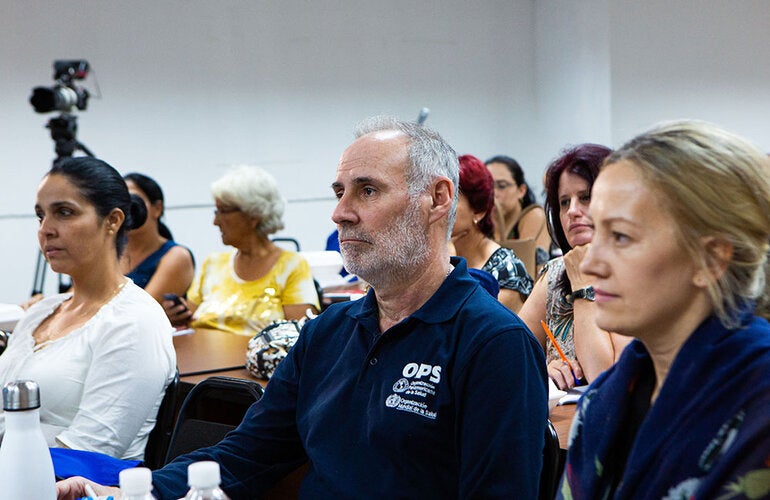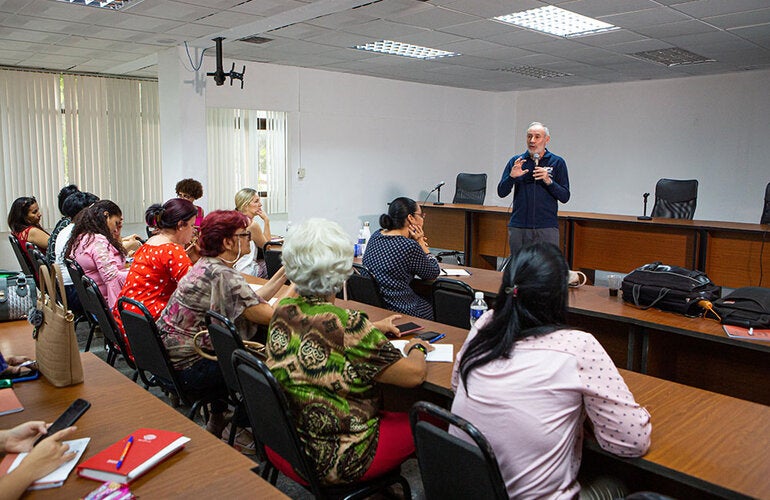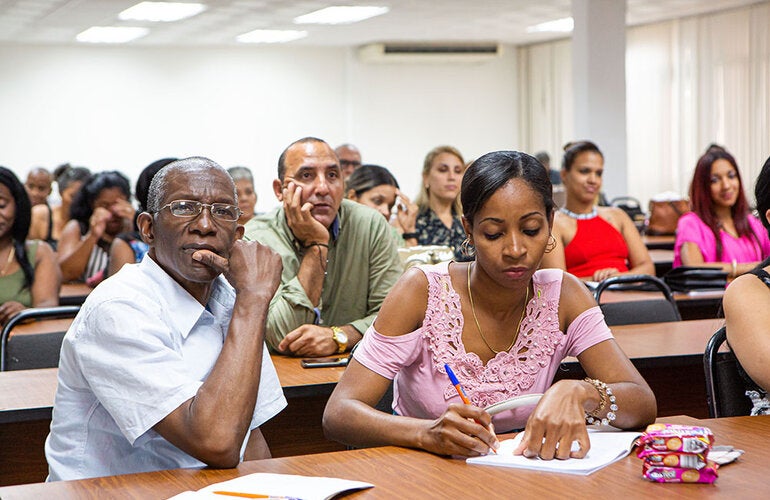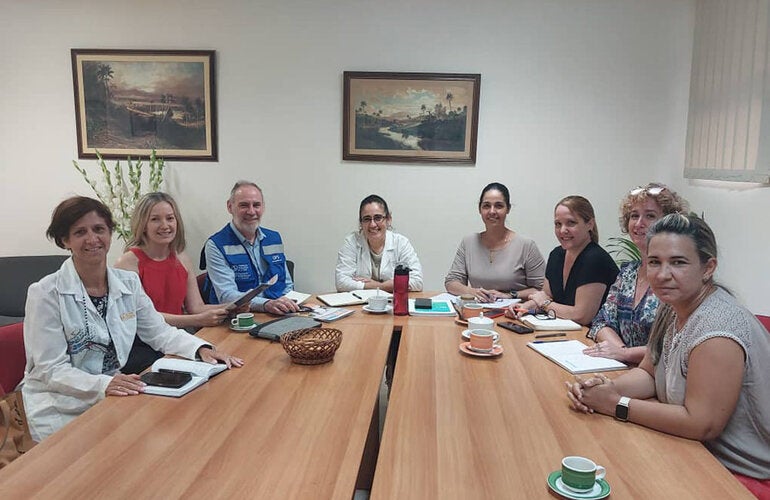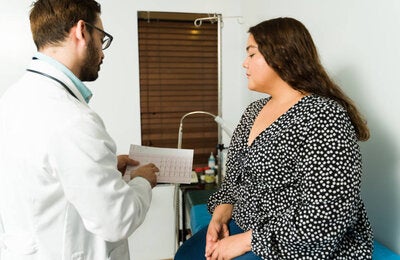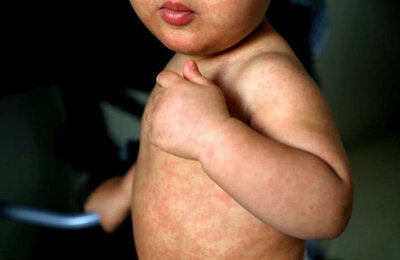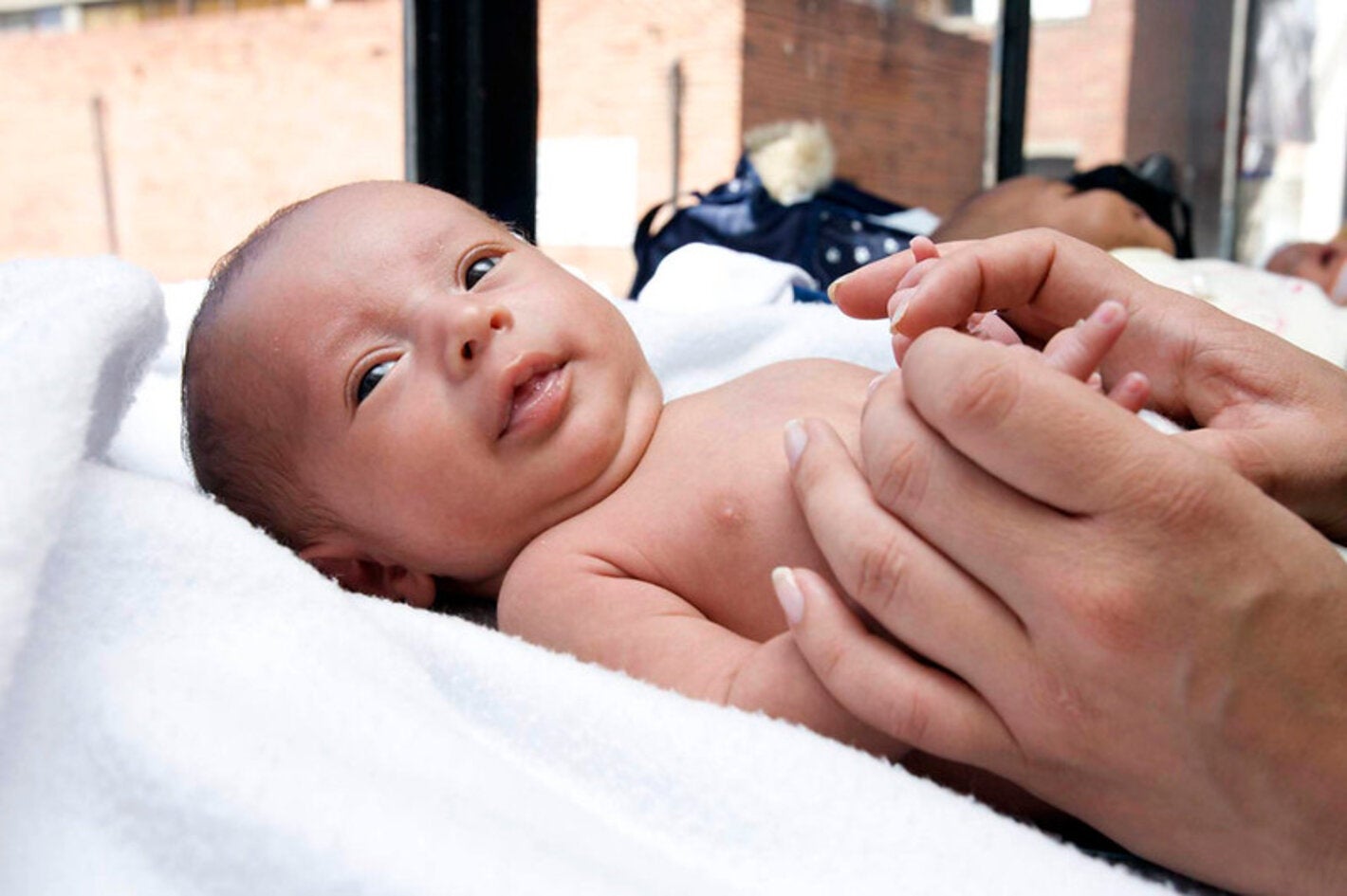
La Havana, Cuba, June 20, 2023 - Increasing the survival of preterm, low birth weight or intrauterine growth retarded newborns; decreasing preventable neonatal mortality; and promoting the health and optimal development of newborns are the results of greatest impact to which the national workshop "Update on comprehensive care of the newborn in neonatology services", held in Havana, Cuba, from 30 May to 1 June, is intended to contribute.
The workshop was coordinated by the Ministry of Public Health (MINSAP) and the Representation of the Pan American Health Organisation/World Health Organisation (PAHO/WHO), in collaboration with the Latin American Centre for Perinatology, Women's Health and Reproductive Health (CLP/WR). The inauguration was attended by Dr. Reinol García Moreiro, Vice-Minister of Medical Assistance and Teaching, who gave the opening remarks and highlighted the importance of this cooperative action.
The initiative was aimed at strengthening the competencies of professionals working in areas related to neonatal health and trained medical and nursing staff from the 15 provinces of the country, as well as geneticists, rehabilitation specialists, members of the National Nursing Group and provincial coordinators of the Maternal and Child Care Programme (PAMI). In total, more than 90 people were trained.
Dr. Pablo Durán, regional advisor on perinatal health at CLP/WR, and Dr. Constanza Soto Conti, collaborator of this centre and neonatologist at the "Ramón Sardá" Maternal and Infant Hospital in Argentina, participated in the event. Both gave several lectures and shared many experiences. Their accompaniment was very useful to review lessons learned, identify current challenges and enrich the debates around the health situation in Cuba and the region.
The three-day conference included the analysis of topics that are essential to achieve indicators of excellence in neonatal care and attention. The topics included breastfeeding; comprehensive care from birth; management of neonatal infections; antimicrobial resistance; physiotherapy for newborns; safety in vaccination; among others.
During the exchanges, the way in which processes are implemented in Cuban health services were reviewed and priorities for future technical cooperation were identified. Emphasis was placed on the need to prepare or update guidelines to help consolidate newborn care and thus ensure increasingly favourable infant health indicators.
In this regard, Dr. Durán pointed out the main areas highlighted by the Cuban side with a view to preparing these guidelines:
"We talked about contributing to interventions around birth and vaccination at this time of life; incorporating some improvements in ventilatory support; and further promoting breastfeeding, as well as the preparation of human milk banks. The latter are essential for adequate nutrition, another element that was highlighted as a priority. At the same time, the need to strengthen the prevention and control of perinatal and neonatal infections was noted".
Dr. Soto added: "The workshop also mentioned that we can work on educating families to become more involved in care, both in the neonatal services and later at home. In general, it was recognised that through communication it is possible to achieve results in different areas, such as hygiene".
Dr. Duniesky Cintra, Life Course Consultant at the Country Office in Cuba, pointed out these last issues as aspects that can be worked on immediately to give continuity to what was discussed in the training sessions: "Strengthening communication at the community level and among professionals on vital issues such as breastfeeding and donation for milk banks are actions that can be promoted in the short term; as well as promoting loving and sensitive care with the aim of deploying the maximum development potential of newborns".
It was also agreed to provide health personnel who participated in the training with PAHO/WHO technical documents associated with these topics, some of which are accompanied by specialised courses on PAHO's Virtual Public Health Campus. The intention is for them to share all this information in their units, as well as the recordings of the lectures, which were audio-visually recorded for this purpose.
Dr. Pablo Durán welcomed the interest of the authorities and the various professionals who attended the training and emphasised the importance of using the available resources. "These are very valuable opportunities for exchange and learning, and they are also opportunities to make available the tools that PAHO/WHO has developed. I am referring to the virtual courses and, in addition, to the existing technical guidelines, which are very clear in relation to what is needed to effectively reduce neonatal mortality and promote healthy development".
In this way, the workshop not only helped to prepare human resources, but also provided a space to systematise the steps to follow in order to continue working together to address the country's priorities in the field of neonatal health. "To promote these efforts, -said Dr. José Moya, PAHO/WHO Representative- Cuba can continue to count on the support of our Country Office and the accompaniment of CLP/WR, a centre with an outstanding track record in the Americas in favour of the health of women, mothers and newborns.
Articulation with the National Genetics Centre in Cuba
It should be noted that, as part of the technical visit, the experts had a meeting at the National Genetics Centre, an institution that also contributes to health care from the first days of life of babies. It coordinates the National Programme for the Diagnosis, Management and Prevention of Birth Defects and Genetic Diseases, through the development of clinical genetics with a community approach.
The purpose of the meeting was to strengthen links and cooperation on surveillance and response to birth defects and metabolic diseases. Correspondingly, the regional advisor was interested in the process of redesignation of the institution as a PAHO/WHO Collaborating Centre, and raised the possibility that the functions be directed to the training of human resources for the implementation of pre- and post-natal genetic diagnostic services, as well as advice for Precision Medicine in the region.
For her part, Dr. C. Beatriz Marcheco Teruel, director of the entity, together with members of her team, explained the commitment they have with the implementation of the country's initiative that pursues the development of Personalised Medicine and Omic Sciences, to improve the health care of the population and contribute to their quality of life.
As a result of the meeting, several agreements were reached, including: inviting Cuba to participate in the generation of global statistics on congenital defects; coordinating virtual chats on the management of newborns with inborn errors of metabolism; reviewing the country's neonatal screening guide; and writing an article on ethical aspects of prenatal diagnosis.

